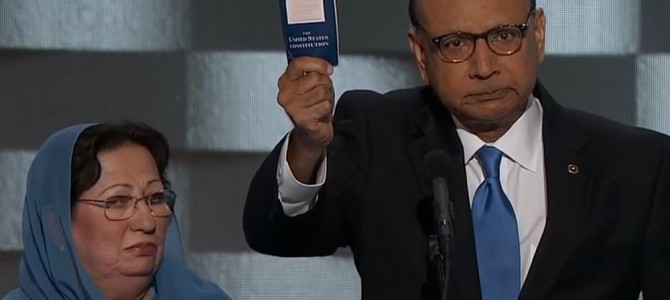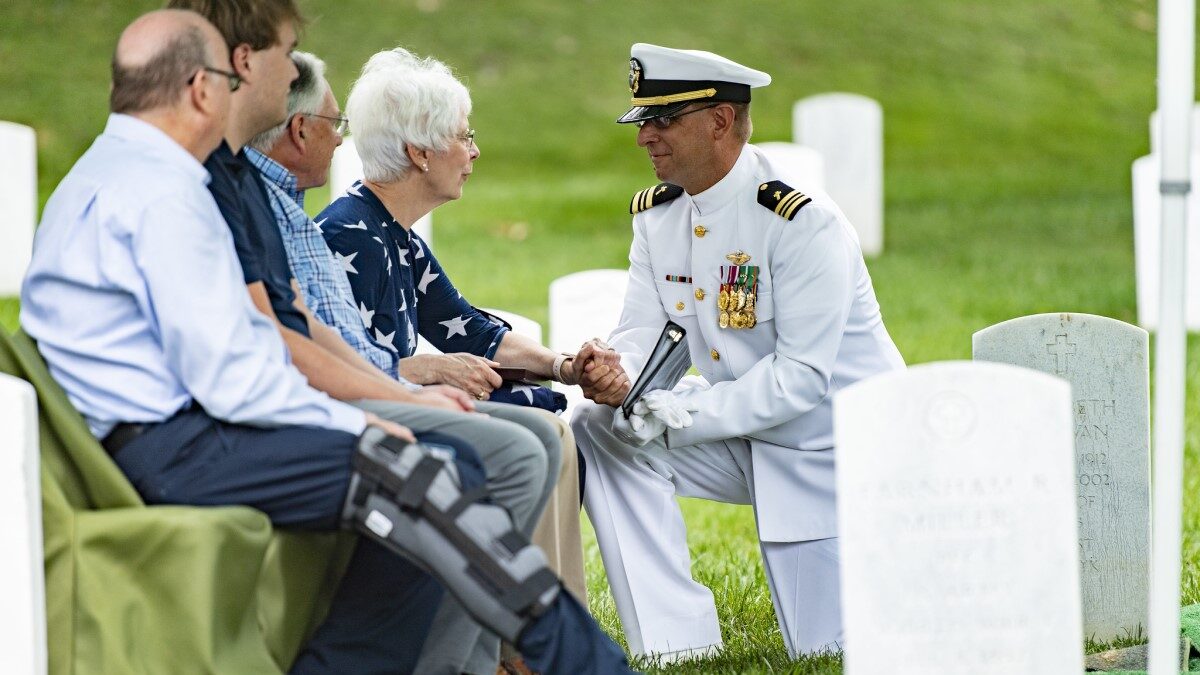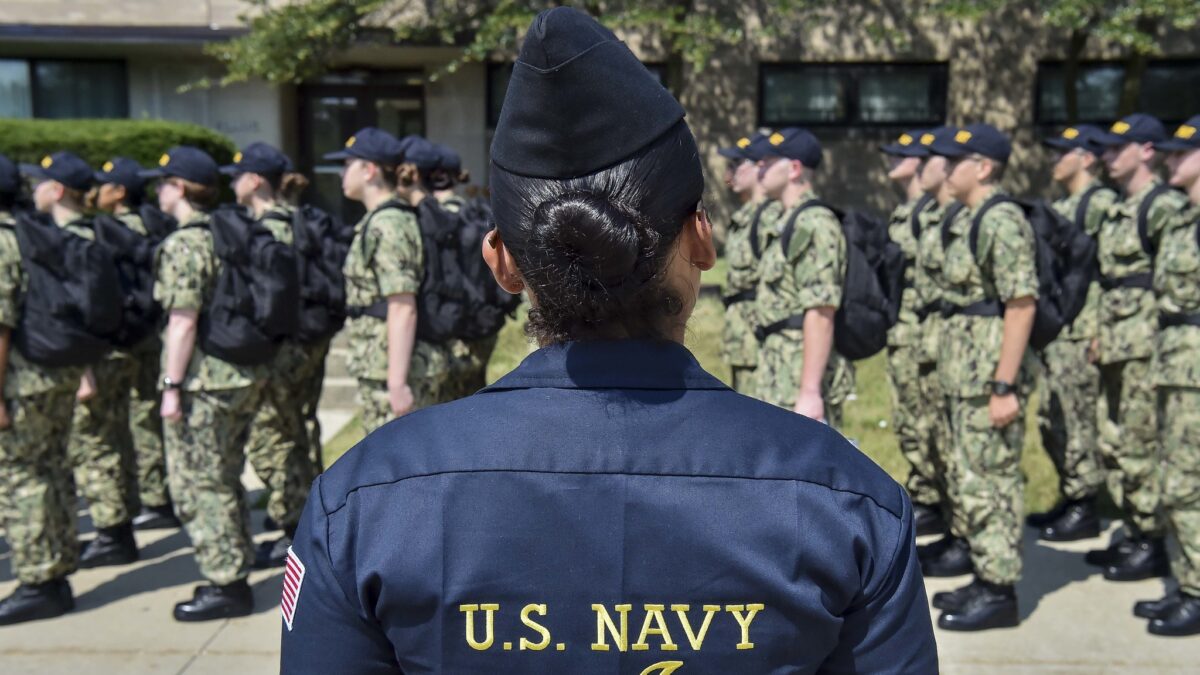
Symbolic stars of all kinds—Blue Stars, Gold Stars, even sheriff’s stars—have played a surprisingly prominent role in this summer’s news. This past week the North Carolina GOP mistook the Blue Star lapel pin worn by vice presidential candidate Tim Kaine, a reference to his son’s Marine service, for the flag of Honduras.
This error would almost be funny, if it were not such a sad display of willful partisanship. Blue Star Mothers of America is a national organization founded in 1942 with about 200 chapters. When one’s child is serving, one is entitled to display a Blue Star banner in the window and wear a Blue Star pin. If one’s child is killed, the Blue Star becomes a Gold Star. You can’t blame people for not knowing this, although you can blame the North Carolina GOP for its haste in criticizing Kaine. I knew nothing of Blue Stars myself, until my son joined the military.
Now to Gold Stars. The speech by Gold Star parent Khizr Khan at the Democratic National Convention about the death in Iraq of his son, Army Captain Humayun Khan, has elicited much comment, especially his challenge to Donald Trump, “You have sacrificed nothing and no one.” Perhaps Khan was wrong to issue this challenge, for of course we don’t require our leaders to have lost children in battle, or even to have served in the armed forces themselves.
But as the mother of a son who was deployed to the most dangerous part of Afghanistan and thankfully returned home safely, I am inclined to side with Khan against those now attacking him for this statement. I have been flooded with painful memories of what it’s like to be a parent of someone deployed in a very dangerous place.
A Decent Person Says ‘I’m Sorry for Your Loss’
When your son or daughter is in a combat zone, you do not sleep except with a telephone next to the pillow. You can’t decide if you should obsessively follow the news or avoid watching it. You break into sobs while driving down the highway. You can’t listen to country music songs about Arlington Cemetery, you have unaccountable fits of anger when a well-intentioned person asks if the troops get to come home for the holidays, and you hear your child’s voice via a static-filled satellite phone line only once in eight months. You know someone in the battalion has been killed when all outgoing emails are shut down so the bereaved family can be notified, and you swing between sadness for them and terrible relief that it’s not your child.
The Khan parents were making the point that Muslims do serve honorably and courageously in the American military, and that Trump was wrong to disparage every person of their faith and question their patriotism in such a blanket manner. It was a dramatic moment. I am no legal scholar, and Khan may or may not be correct about whether Trump’s immigration proposals are constitutional—hard to judge because the wording of the proposals changes so often—but those Trump supporters who are now debating the legal or constitutional points Khan was making are merely trying to deflect attention from the shocking lack of compassion their candidate displayed after that speech.
A decent person should have learned that the first and most important thing one can say to a grieving parent is, “I’m sorry for your loss.” Rather than expressing sympathy for the loss of Captain Khan, or even mentioning his death in battle, Trump’s first reactions were to criticize Mrs. Khan for not speaking, imply it was related to Islam’s demeaning treatment of women, and assert he has also sacrificed a lot (citing his hard work for his own business): “I’ve made a lot of sacrifices. I work very, very hard. I’ve created thousands and thousands of jobs, tens of thousands of jobs, built great structures. I’ve had tremendous success. I think I’ve done a lot.”
Had Trump behaved in a manner befitting a man who aspires to become our commander in chief, it might be time to move on to a discussion of whether a ban on Muslim immigration is constitutional, or whether building a wall is a good policy idea. But he did not, and his scores of surrogates and apologists continue to find ways to excuse him by deflecting attention to Hillary Clinton and Benghazi, or Cindy Sheehan, or the threat of radical Islamic terrorism and unchecked immigration.
Let’s Re-Sacralize a Soldier’s Sacrifice
It is time instead to reflect for a moment on sacrifice in battle. We have a special term, really a euphemism, for members of the military who fall in battle. We say they “made the ultimate sacrifice.” The word “sacrifice” is from the Latin, “to make sacred.” We citizens must make the death sacred, otherwise it’s just a meaningless, unhappy occurrence somewhere far away. Our nation needs to elevate the deaths of those who die in uniform, serving us. For the most part, it does a good job.
I will concede that if someone dies in battle, it is not the parents who have made the sacrifice, because they didn’t ask their child to join the military. The sacrifice has been made by the warrior who died for friends and country. Those of us whose children decided to join the military do not, and should not, get credit for that decision.
However, it is the height of churlishness for the rest of us to argue with the bereaved Khan parents about whether what they are experiencing is a sacrifice or “merely” a form of deep sorrow. We tend to throw the word “sacrifices” around pretty easily. We talk about the sacrifices working parents make. We sacrifice pay for benefits at work; we even have sacrifice flies in baseball. Our daily sacrifices—donations to charity, for instance, a decision to work at a nonprofit at lower pay, or hours spent taking care of an elderly parent—are important, but they are of a different order from the sacrifice represented by the loss of a child on the battlefield.
It is the duty of our country to accord bereaved military families special honors and a special status. A healthy nation develops language and ceremonies to honor those who have died in battle. It provides them special cemeteries and burial rituals. Rather than rushing to attack and criticize them, it reserves a special place for their loved ones in its heart.
Death Is Not Sweet, But It Can Be Honorable
In 2009, thanks to a fellow Marine mother, I found a useful support group, MarineParents.com, a national charity on whose board I now serve (but whose views I do not represent in this article). At the height of the Iraq and Afghanistan conflicts, this organization provided online message boards for parents, sorted according to individual companies within battalions.
We did not know one another and would never meet in person, but we could figuratively “hold hands across the Internet” as our children flew into the most dangerous village in Helmand Province. We could divert our attention from our all-consuming fear during those eight months by chatting about care packages and birthday messages via “Moto-mail” and what color socks the colonel was allowing the troops to wear—white was the color the Marines preferred, but it did not meet uniform regulations.
There was a lively participant in our ongoing discussion about socks in care packages whose son was an explosive ordnance disposal specialist. The next day we read this mom’s son had been killed by an IED. I kept thinking about the khaki socks she had selected that her son would never need. In a moment she had moved to the elevated, and dreaded, status of Gold Star mother. She could avail herself of the love and sympathy of other Gold Star parents in the private Gold Star forum on the Marine Parents website, although whether she did so or found it helpful I never knew.
In junior high in the mid-1960s, my schoolmates and I learned the patriotic poem by World War I poet John McCrae, “In Flanders Fields”: “Take up our quarrel with the foe: To you, from failing hands, we throw The torch; be yours to hold it high.”
A few years later we were considered sophisticated enough to study anti-war poetry from the same war. Reflecting on the words of the Roman poet Horace (Dulce et decorum est, pro patria mori—it is sweet and honorable to die for one’s country), Wilfred Owen responded with a depiction of a soldier dying horribly from mustard gas: “If in some smothering dreams you too could pace Behind the wagon that we flung him in… My friend, you would not tell with such high zest To children ardent for some desperate glory, The old Lie: Dulce et decorum est Pro patria mori.”
Death is not sweet, even if it occurs fighting for one’s country. But we need to honor those who are willing to take on that challenge, and have the grace and maturity to step aside from partisan politics for a moment to remember to be grateful.









